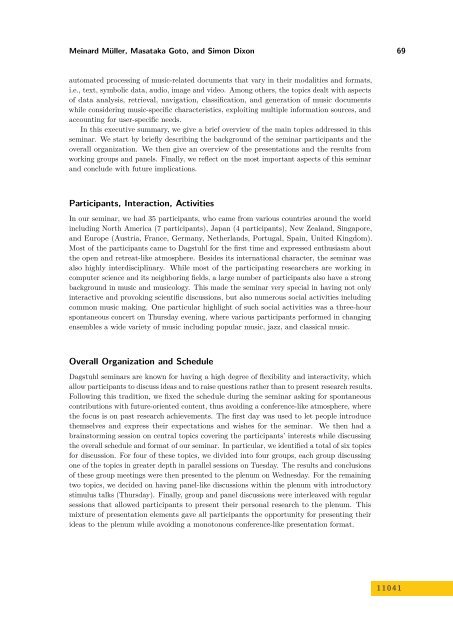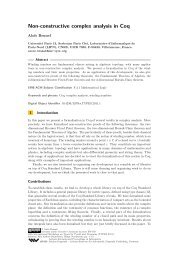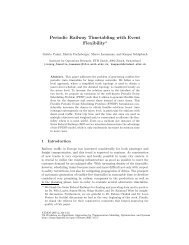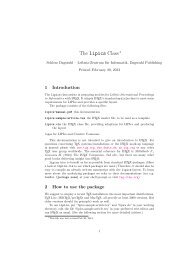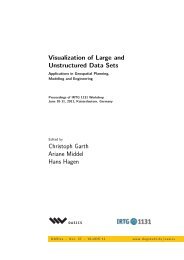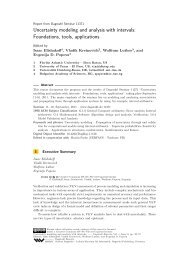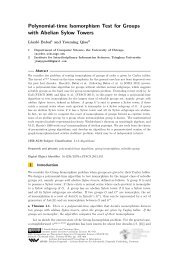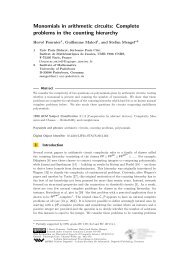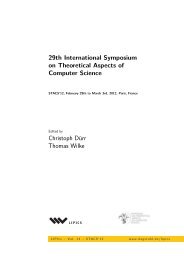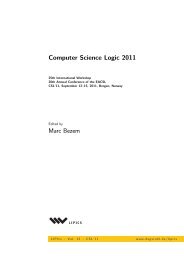Volume 1, Issue 1, January 2011 - DROPS - Schloss Dagstuhl
Volume 1, Issue 1, January 2011 - DROPS - Schloss Dagstuhl
Volume 1, Issue 1, January 2011 - DROPS - Schloss Dagstuhl
You also want an ePaper? Increase the reach of your titles
YUMPU automatically turns print PDFs into web optimized ePapers that Google loves.
Meinard Müller, Masataka Goto, and Simon Dixon 69<br />
automated processing of music-related documents that vary in their modalities and formats,<br />
i.e., text, symbolic data, audio, image and video. Among others, the topics dealt with aspects<br />
of data analysis, retrieval, navigation, classification, and generation of music documents<br />
while considering music-specific characteristics, exploiting multiple information sources, and<br />
accounting for user-specific needs.<br />
In this executive summary, we give a brief overview of the main topics addressed in this<br />
seminar. We start by briefly describing the background of the seminar participants and the<br />
overall organization. We then give an overview of the presentations and the results from<br />
working groups and panels. Finally, we reflect on the most important aspects of this seminar<br />
and conclude with future implications.<br />
Participants, Interaction, Activities<br />
In our seminar, we had 35 participants, who came from various countries around the world<br />
including North America (7 participants), Japan (4 participants), New Zealand, Singapore,<br />
and Europe (Austria, France, Germany, Netherlands, Portugal, Spain, United Kingdom).<br />
Most of the participants came to <strong>Dagstuhl</strong> for the first time and expressed enthusiasm about<br />
the open and retreat-like atmosphere. Besides its international character, the seminar was<br />
also highly interdisciplinary. While most of the participating researchers are working in<br />
computer science and its neighboring fields, a large number of participants also have a strong<br />
background in music and musicology. This made the seminar very special in having not only<br />
interactive and provoking scientific discussions, but also numerous social activities including<br />
common music making. One particular highlight of such social activities was a three-hour<br />
spontaneous concert on Thursday evening, where various participants performed in changing<br />
ensembles a wide variety of music including popular music, jazz, and classical music.<br />
Overall Organization and Schedule<br />
<strong>Dagstuhl</strong> seminars are known for having a high degree of flexibility and interactivity, which<br />
allow participants to discuss ideas and to raise questions rather than to present research results.<br />
Following this tradition, we fixed the schedule during the seminar asking for spontaneous<br />
contributions with future-oriented content, thus avoiding a conference-like atmosphere, where<br />
the focus is on past research achievements. The first day was used to let people introduce<br />
themselves and express their expectations and wishes for the seminar. We then had a<br />
brainstorming session on central topics covering the participants’ interests while discussing<br />
the overall schedule and format of our seminar. In particular, we identified a total of six topics<br />
for discussion. For four of these topics, we divided into four groups, each group discussing<br />
one of the topics in greater depth in parallel sessions on Tuesday. The results and conclusions<br />
of these group meetings were then presented to the plenum on Wednesday. For the remaining<br />
two topics, we decided on having panel-like discussions within the plenum with introductory<br />
stimulus talks (Thursday). Finally, group and panel discussions were interleaved with regular<br />
sessions that allowed participants to present their personal research to the plenum. This<br />
mixture of presentation elements gave all participants the opportunity for presenting their<br />
ideas to the plenum while avoiding a monotonous conference-like presentation format.<br />
1 1 0 4 1


